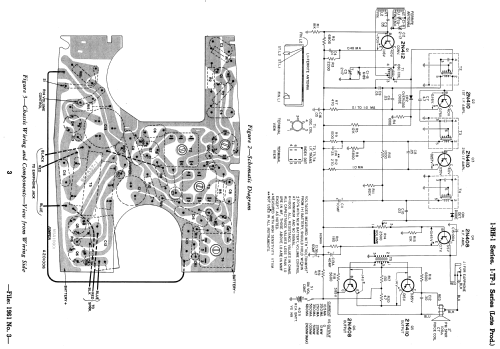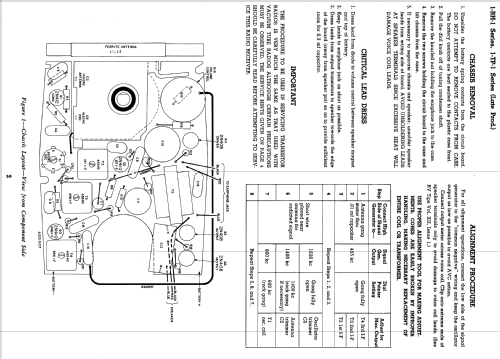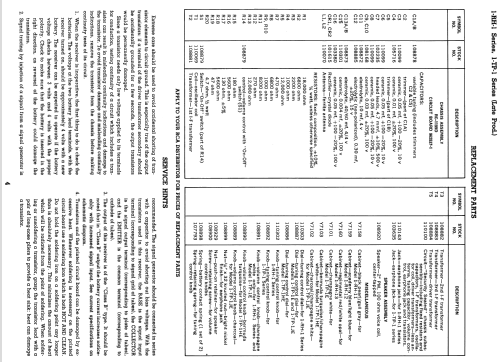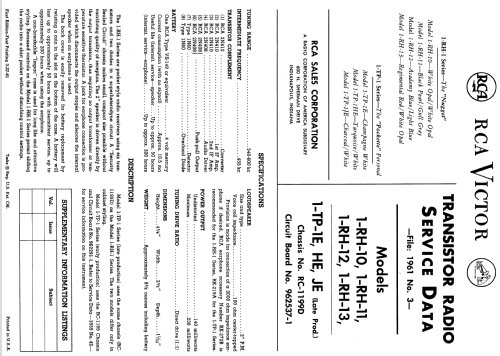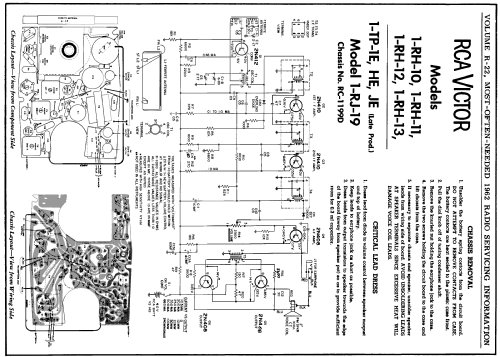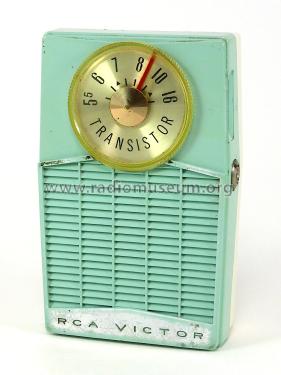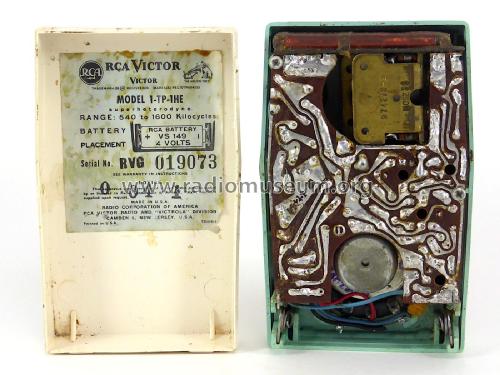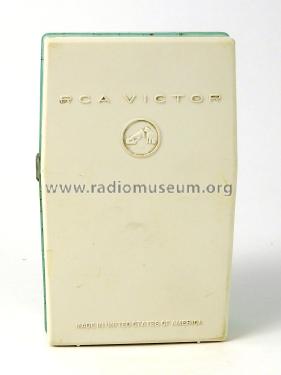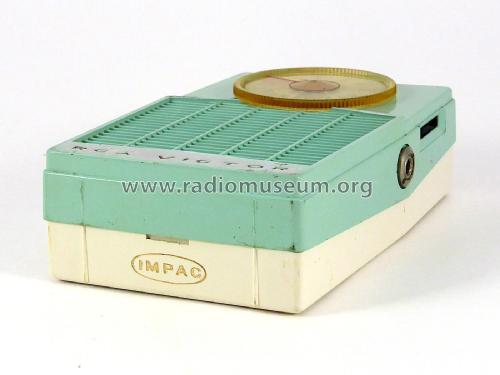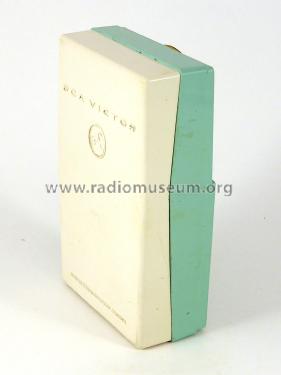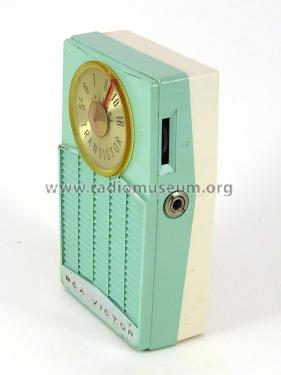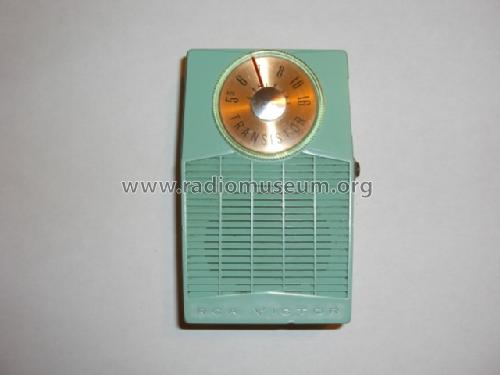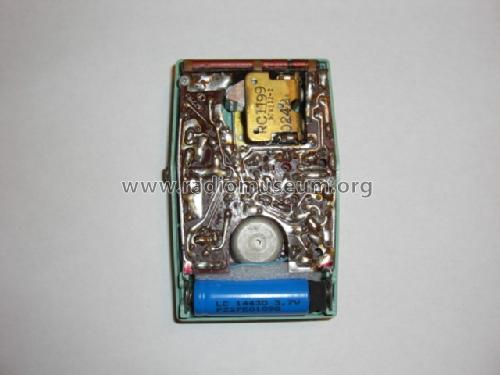1-TP-1HE "The Pockette Personal" Ch= RC-1199D Late Production
RCA (RCA Victor Co. Inc.); New York (NY)
- Country
- United States of America (USA)
- Manufacturer / Brand
- RCA (RCA Victor Co. Inc.); New York (NY)
- Year
- 1960/1961

- Category
- Broadcast Receiver - or past WW2 Tuner
- Radiomuseum.org ID
- 88189
-
- alternative name: RCA Manufacturing || Victor Talking Machine
Click on the schematic thumbnail to request the schematic as a free document.
- Number of Transistors
- 6
- Main principle
- Superheterodyne (common); ZF/IF 455 kHz; 2 AF stage(s)
- Tuned circuits
- 5 AM circuit(s)
- Wave bands
- Broadcast only (MW).
- Power type and voltage
- Dry Batteries / 4 Volt
- Loudspeaker
- Permanent Magnet Dynamic (PDyn) Loudspeaker (moving coil) / Ø 2 inch = 5.1 cm
- Power out
- 0.14 W (0.23 W max.)
- Material
- Plastics (no bakelite or catalin)
- from Radiomuseum.org
- Model: 1-TP-1HE "The Pockette Personal" Ch= RC-1199D [Late Production] - RCA RCA Victor Co. Inc.; New
- Shape
- Very small Portable or Pocket-Set (Handheld) < 8 inch.
- Dimensions (WHD)
- 2.5 x 4.25 x 1 inch / 64 x 108 x 25 mm
- Notes
-
The RCA 1-TP-1HE (Late Production) is a battery operated, 6 transistor portable AM radio. The AM band frequency tuning range is 540 - 1600kHz. Has push-pull output stage and earphone jack that disconnects the speaker for private listening. The output stage is bypassed when the earphone is used. Uses Qty(1) RCA type VS-149 4V mercury battery.
The following models are covered in the RCA Service Datasheet and use the same chassis:
Models Cabinet Colors 1-RH-10 White Opal/White Opal 1-RH-11 Black Pearl/Gull Gray 1-RH-12 Academy Blue/Light Blue 1-RH-13 Regimental Red/White Opal 1-TP-1E (Late Production)* Champagne White 1-TP-1HE (Late Production)* Turquoise/White 1-TP-1JE (Late Production)* Charcoal/White * - The 1-TP-1 series (Early Production) uses the RC-1199 chassis, refer to the RCA Service Datasheet 1959, No.42
- Net weight (2.2 lb = 1 kg)
- 0.55 lb (0 lb 8.8 oz) / 0.250 kg
- Literature/Schematics (1)
- - - Manufacturers Literature (RCA Radio Service Data Datasheet - File 1961 No. 3 Dated 3-27-61)
- Literature/Schematics (2)
- Beitman Radio Diagrams, Vol. 22, 1962 (Page 92)
- Literature/Schematics (3)
- Photofact Folder, Howard W. SAMS (Set 551, folder 9, 10-61)
- Author
- Model page created by Egon Penker. See "Data change" for further contributors.
- Other Models
-
Here you find 5134 models, 3237 with images and 4171 with schematics for wireless sets etc. In French: TSF for Télégraphie sans fil.
All listed radios etc. from RCA (RCA Victor Co. Inc.); New York (NY)
Collections
The model 1-TP-1HE "The Pockette Personal" is part of the collections of the following members.
Forum contributions about this model: RCA RCA Victor Co.: 1-TP-1HE "The Pockette Personal" Ch= RC-1199D
Threads: 1 | Posts: 1
4 Volt Battery Replacement. -Last year I purchased on ebay a very cute and very small transistor radio made by RCA Victor in 1960. The radio is powered by a 4 Volt battery, a size of an AA or S-14 cell. The 4 V batteries are not available any longer, I think. -I like to keep all my radios fully operational. I enjoy listening to them and love to show them and tell about them to those who are interested. So I had to solve the problem of the 4 Volt battery for the tiny radio. I purchased a generic Sony Camcorder Li Ion NP-FP50 battery for $6 /free shipping from Hong Kong/. The battery is built of two 3.7V. cells. The capacity is 900mAh, I believe. The diameter of the cell is 14mm and the length is 42mm. I soldered a small extension connector to the negative terminal of the cell to make it exactly the same size as an AA /S-14/ cell. /Please see the picture./ I charged the cell in a Li Ion battery charger. NiCad or NiMH battery chargers are not suitable. The fully charged cell has almost 4 Volts, enough to power the radio for many hours. The power consumption of the radio is about 30 mA. The shelf life of Li Ion rechargeable cells is very long. Much much longer than NiCads.
Attachments
- modified 4 Volt battery (92 KB)
Joseph Arszennik, 23.Jan.10
